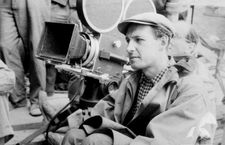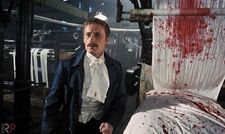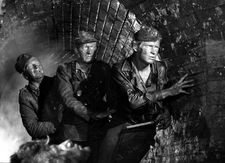_600.jpg) |
| Andrzej Wajda Film School lecturer Volker Schlöndorff on the Return to Montauk set in New York Photo: Anne-Katrin Titze |
In Volker Schlöndorff's tribute to Andrzej Wajda, who died on Sunday, October 9, 2016, he recalls the impact he had on him and the actors the legendary director worked with, including Hannah Schygulla, Gerard Depardieu, Krystyna Janda, Daniel Olbrychski, Wojciech Pszoniak and Andrzej Chyra.
 |
| Andrzej Wajda on the set of Kanal |
Volker has been teaching at the Andrzej Wajda Film School and in his remembrance he gives us an intimate portrait of a filmmaker who impressed him early on with Kanal, Ashes And Diamonds and The Promised Land, and even more later in life when he got to know the man behind the films.
Andrzej Wajda received an honorary Oscar in 2000 from the Academy of Motion Picture Arts and Sciences.
"It is going to be a heavy walk and a beautiful day when Andrzej Wajda will be carried to his grave. A heavy farewell to a friend, who, during 60 of his 90 years accompanied me from afar and up close. Heavy, or rather, difficult, the political, stately dimension of such a day. Because if Wajda, abroad, was not only the best-known Polish artist, but actually, simply 'was Poland', the same way Bergman 'was Sweden', in his own country, although revered, he had always also been politically co-opted and sometimes burnt. That was due to his curiosity and his unprejudiced openness, which connected him with people and events from all parts of society and the history of Poland.
 |
| Ashes And Diamonds |
"As a former, very young resistance fighter he told about the despair of the last remaining people trapped in the Warsaw ghetto whose flight through a canal ended in front of a cast-iron grate. An image of Polish history. The malaise of the post-war generation finds in Wajda its Rimbaud, in Zbigniew Cybulsk its James Dean. Workers, nobility, officers, revolutionaries, and again and again, strong women from all classes cover the entire spectrum of Polish society and history. From the sum of his films emerges the, perhaps most complete, in any case, most humane picture that one can have of Poland. When he, after the triumph of Solidarnosc, let himself be made a parliamentarian for a short while, the impression of the "political" Wajda was consolidated. Yet none of his films or theatre productions could be contained dogmatically, ideologically or in any other way taken in by party politics.
"Whether he made films in Lodz, staged theatre in Krakow, was politically and pedagogically active in Warsaw, dedicated himself to the shipyard workers of Gdansk/Gdynia - with no less than three films - he always remained a loner and individualist. Collective was the teamwork, but the inspiration was always personal and individual. He only told from his own experience. That's why his films touch people far beyond Poland. He is one of the greatest humanist personalities, comparable to Albert Camus, one of the famous lighthouses, to whom I entrusted myself all my life.
 |
| The Promised Land |
"This voice was heard beyond Europe, in the US as much as in Japan, just look at the two biggest awards they have to hand out, the Oscar and the Tokyo Award. His funeral will also be a beautiful day because Andrzej Wajda attached great importance to friendship. Everyone will be there, the crew and actors from his films. How much they all admired him, was palpable in each encounter, quietly, lovingly, they interacted with him. Only he himself, the master, in his great modesty, never seemed to notice. He was surprised about every compliment that was given. It wasn't about him, but about the subject, and the subject was art.
"In 1958, I got lost in an alley of the Latin Quarter and into the Cujas cinema where I saw Kanal. Later, in the same location, Ashes And Diamonds. As a young German and wannabe director, I was shattered. Something like this we would never accomplish. We simply stood on the wrong side of history. We would never be able to speak so truly. So quietly and yet with such force. Also, the dynamics of his following films, The Promised Land especially, furious as it was, intimidated me rather than encouraged me. Via a detour to the Librairie Polonaise on Boulevard Saint Germain, I approached the country from which this man and these films originated. Because as much as these films intimidated me, I wanted them to be my role model. So I went from Germany to France in order to discover Poland. My own Weimar triangle.
 |
| Kanal |
"For 15 years, I have been teaching at the Andrzej Wajda Film School in Warsaw. I never experienced him on set, but in his masterclasses, where he works with young filmmakers to give their projects the finishing touches, I experienced him indirectly as director. Contrary to his films, he himself never intimidated anyone. He captivates, albeit quietly, yet determined, emotionally charged to the max, so that one can only succumb to his advice, his orders, his example, the way an orchestra follows its conductor. This is the way he worked with his actors and actresses - at home with Krystyna Janda, Daniel Olbrychski, Wojciech Pszoniak and Andrzej Chyra or in Berlin with Hannah Schygulla or in Paris with Gerard Depardieu. And they were never as good as with Wajda.
"This glow distinguished the private man as well. Over a meal in his small, old-fashioned house filled with antiques, carpets and paintings, there was never small talk. With Polish, French, English and German all spoken mixed together, the man of the house, always very charming, remained serious. Being an artist means being one in a long chain that included, from the Renaissance until today, literature, music and primarily painting. Film still had to prove itself. Andrzej Wajda still had many projects. In his diary over the years he sketched out all of them, '80 in number', he said. 'He wouldn't get to do them all, I should pick one.'" - Volker Schlöndorff





















